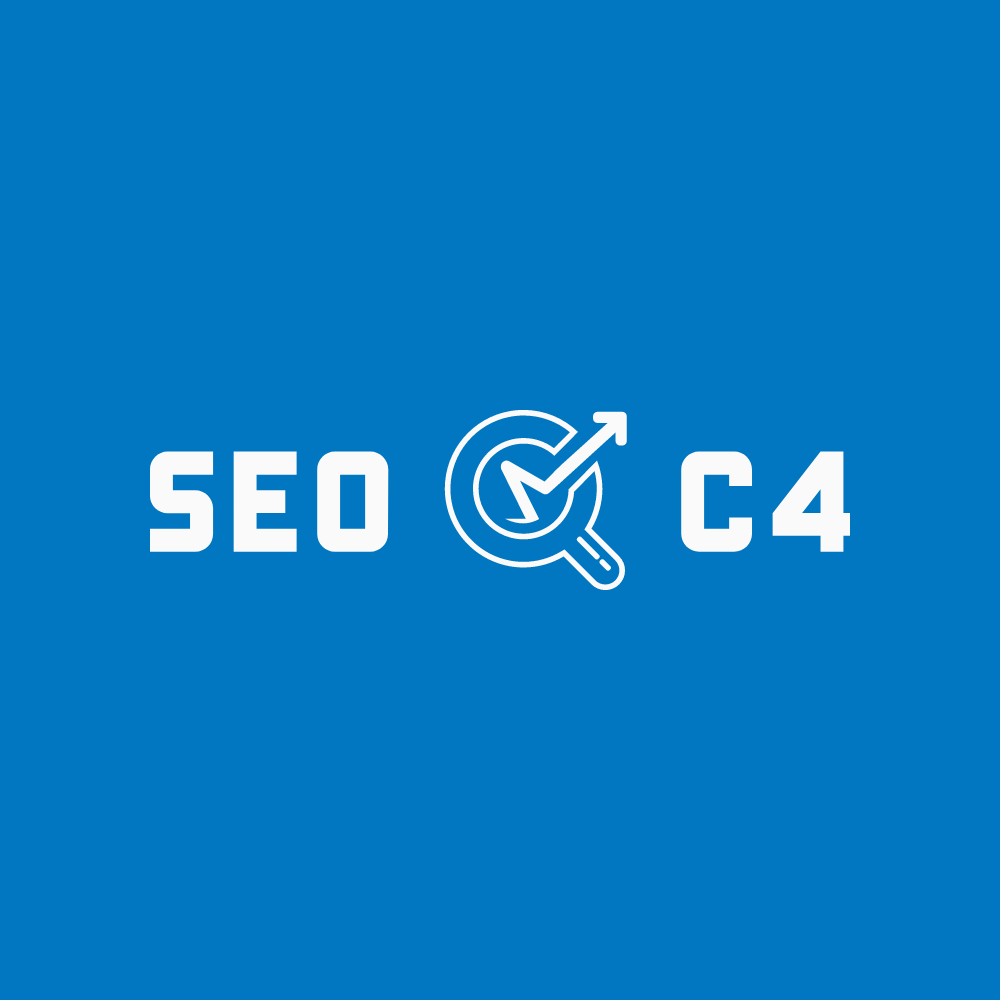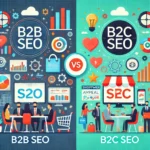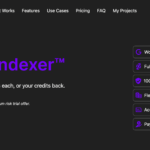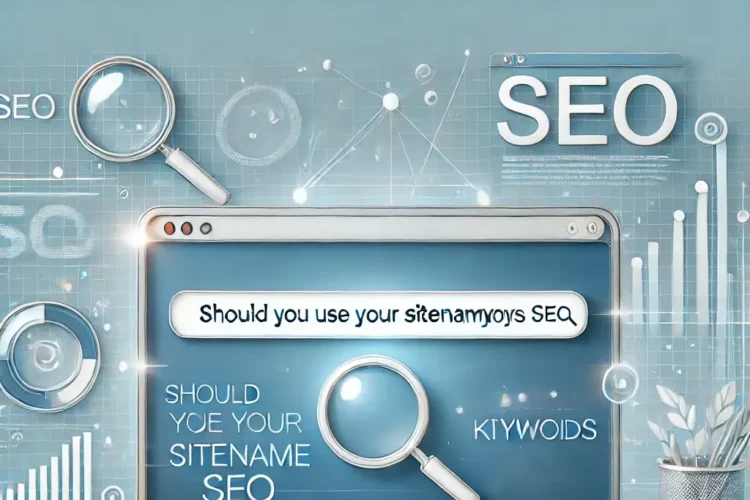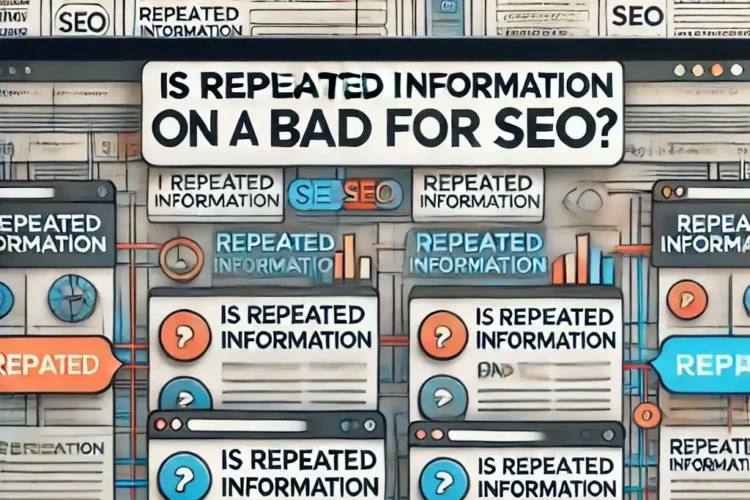
When it comes to SEO, there’s no one-size-fits-all approach. Search engine optimization for business-to-business (B2B) companies requires a unique strategy compared to business-to-consumer (B2C) SEO. In this blog, we’ll break down the differences between B2B and B2C SEO, explore why each approach requires specific strategies, and provide actionable insights on how to effectively implement them.
Detailed comparison table highlighting the key differences between B2B and B2C SEO:
| Feature | B2B SEO | B2C SEO |
|---|---|---|
| Audience | Primarily business professionals, decision-makers, and company representatives | General consumers looking for products or services for personal use |
| Buyer Intent | Research-focused; looking for solutions to improve business performance, profitability, or efficiency | Transactional-focused; consumers are often looking for products or services that fulfill personal needs |
| Content Style | Formal, professional, and data-driven; emphasizes technical details and industry terminology | Friendly, engaging, and approachable; focuses on storytelling, emotional appeal, and consumer benefits |
| Keyword Strategy | Uses niche, industry-specific keywords with lower search volume but higher relevance to decision-makers | Uses high-volume, general keywords with broader appeal and competition |
| Sales Funnel | Longer and complex, requiring multiple stages; involves lead nurturing and education | Shorter, aiming for quick conversions and impulse buying decisions |
| Content Types | Blogs, white papers, case studies, in-depth guides, LinkedIn articles, webinars | Blog posts, product descriptions, video tutorials, reviews, and social media content |
| Tone | Authoritative, credible, and information-rich | Conversational, relatable, and often emotional |
| Backlink Strategy | Targets high-quality backlinks from industry-relevant sites and authoritative sources | Targets a mix of high-authority sites, social platforms, and high-traffic websites |
| Social Media Focus | Primarily LinkedIn, industry forums, and professional networks for audience engagement | Instagram, Facebook, YouTube, and other platforms suited for consumer interaction |
| Conversion Metrics | Lead generation, qualified lead nurturing, demo requests, consultations | Direct sales, sign-ups, product purchases, and customer loyalty |
| SEO Goal | Establish authority, build trust, and educate target audiences | Increase visibility, drive quick conversions, and engage consumers for repeat purchases |
| User Experience (UX) | Focuses on an informational, clean layout for professional appeal | Focuses on an engaging, visually appealing design to attract and retain general consumers |
| Decision-Making Process | Involves multiple stakeholders and can take weeks to months to finalize a decision | Typically made by individual consumers and can be instant or within a few days |
| Prominent Search Engines | Often prioritizes professional and industry-specific platforms alongside Google (e.g., LinkedIn search) | Primarily focused on Google, but also benefits from image and video search engines like Pinterest, YouTube |
| Analytics Focus | Focuses on lead generation metrics, customer lifetime value (CLV), and account-based metrics | Emphasizes click-through rate (CTR), conversion rate, and customer journey analysis |
Understanding B2B SEO and B2C SEO
B2B SEO focuses on targeting other businesses and professional decision-makers. The goal is to provide solutions that appeal to companies, helping them improve efficiency, profitability, or productivity. B2B SEO relies on longer sales cycles, complex decision-making, and highly specific, industry-relevant keywords.
B2C SEO focuses on attracting individual consumers looking for products or services for personal use. B2C SEO generally emphasizes quicker purchasing decisions, shorter sales funnels, and more engaging content to encourage impulse purchases. B2C SEO keywords are usually broad and focused on consumer needs.
Key Differences Between B2B and B2C SEO
- Audience Targeting and Buyer Intent
- B2B SEO targets business professionals and decision-makers, who often seek detailed information and evidence of value. Here, content like white papers, case studies, and in-depth guides are critical.
- B2C SEO aims to attract consumers with a variety of needs, from shopping to seeking advice. The buyer intent is usually transactional, so content that’s easy to digest and attention-grabbing is key, such as product descriptions and social proof.
- Content Style and Tone
- In B2B SEO, content is generally formal, informative, and data-driven. Industry-specific jargon and technical terms are common.
- For B2C SEO, content is friendlier, relatable, and designed to engage. B2C brands often employ a conversational tone to build emotional connections and trust.
- Keywords and Search Terms
- B2B keywords are niche and industry-specific, focusing on terms relevant to a specific sector. Keywords often have lower search volumes but higher conversion potential, as they target a select audience.
- B2C keywords tend to have high search volumes but are highly competitive. Terms are often shorter and general, capturing the interests of a broader audience.
- Sales Funnel and Conversion Strategy
- B2B sales funnels are long, requiring content to nurture leads through multiple stages. SEO for B2B focuses on each stage, with specific content like case studies, blog posts, and white papers tailored to nurture relationships over time.
- B2C sales funnels are typically shorter, and SEO emphasizes attracting and converting consumers faster. High-quality product descriptions, positive reviews, and engaging blog content are critical here.
- Content Types and Resources
- B2B content types include white papers, case studies, blogs, LinkedIn articles, webinars, and in-depth guides. The focus is on educating and informing the audience to facilitate better decision-making.
- B2C content is more varied, ranging from blog posts and social media content to product descriptions and video tutorials. The goal is to engage quickly and convert consumers through an emotional appeal.
- Backlink Strategies
- For B2B, backlinks often come from authoritative, industry-related sites. The focus is on quality over quantity to build a reputable image.
- B2C backlinking strategies target a mix of high-authority domains, news outlets, and social platforms, emphasizing exposure and reach.
Why B2B and B2C SEO Strategies Matter
According to a survey by BrightEdge, 68% of all online experiences start with a search engine, underscoring the importance of a solid SEO strategy. However, only 33% of B2B marketers feel confident in their SEO approach, primarily because many businesses are still relying on B2C strategies in a B2B context.
Example:
A B2B brand selling software solutions would be more effective with an SEO strategy that includes in-depth blog posts, industry research, and customer testimonials. On the other hand, a B2C brand selling a skincare product would achieve more success with product reviews, influencer collaborations, and optimized product descriptions.
FAQs
1. Can B2B companies use B2C SEO tactics and vice versa?
B2B companies can incorporate certain B2C SEO techniques, such as a conversational tone in blog posts. However, the main focus should still align with B2B goals, like educating and building long-term relationships.
2. What are some effective tools for B2B and B2C SEO?
For both, tools like Google Analytics, Ahrefs, and SEMrush are invaluable for keyword research and tracking. LinkedIn Analytics is particularly useful for B2B, while Google My Business and social media tools benefit B2C strategies.
3. How often should I update my SEO strategy?
Both B2B and B2C SEO strategies should be reviewed quarterly, as algorithms change and new keywords emerge. For B2B, focus on emerging industry trends, while B2C may prioritize seasonal trends or product cycles.
Summary
B2B and B2C SEO strategies vary significantly in approach, target audience, and content requirements. Understanding these differences will help you craft an SEO strategy that aligns with your business goals, maximizes visibility, and drives better conversions.
Read More
How to Create a Winning B2B SEO Campaign
Don’t Just Sit There! Start SEO
Hire an SEO Expert
